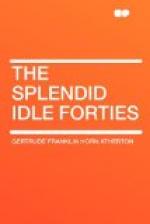“She would not come,” said the Governor. “She said she was tired of the race.”
“Of whom do you speak?” asked De la Vega, who had rejoined them.
“Of Ysabel Herrera, La Favorita of Monterey,” answered Pio Pico. “The most beautiful woman in the Californias, since Chonita Iturbi y Moncada, my Vicente. It is at her uncle’s that I stay. You have heard me speak of my old friend; and surely you have heard of her.”
“Ay!” said De la Vega. “I have heard of her.”
“Viva El Rayo!”
“Ay, the ugly brute!”
“What name? Vitriolo? Mother of God! Diablo or Demonio would suit him better. He looks as if he had been bred in hell. He will not stand the quirto; and El Rayo is more lightly built. We shall beat by a dozen lengths.”
The two vaqueros who were to ride the horses had stripped to their soft linen shirts and black velvet trousers, cast aside their sombreros, and bound their heads with tightly knotted handkerchiefs. Their spurs were fastened to bare brown heels; the cruel quirto was in the hand of each; they rode barebacked, winding their wiry legs in and out of a horse-hair rope encircling the body of the animal. As they slowly passed the crowd on their way to the starting-point at the lower end of the field, and listened to the rattling fire of wagers and comments, they looked defiant, and alive to the importance of the coming event.
El Rayo shone like burnished copper, his silver mane and tail glittering as if powdered with diamond-dust. He was long and graceful of body, thin of flank, slender of leg. With arched neck and flashing eyes, he walked with the pride of one who was aware of the admiration he excited.
Vitriolo was black and powerful. His long neck fitted into well-placed shoulders. He had great depth of girth, immense length from shoulder-points to hips, big cannon-bones, and elastic pasterns. There was neither amiability nor pride in his mien; rather a sullen sense of brute power, such as may have belonged to the knights of the Middle Ages. Now and again he curled his lips away from the bit and laid his ears back as if he intended to eat of the elegant Beau Brummel stepping so daintily beside him. Of the antagonistic crowd he took not the slightest notice.
“The race begins! Holy heaven!” The murmur rose to a shout—a deep hoarse shout strangely crossed and recrossed by long silver notes; a thrilling volume of sound rising above a sea of flashing eyes and parted lips and a vivid moving mass of colour.
Twice the horses scored, and were sent back. The third time they bounded by the starting-post neck and neck, nose to nose. Jose Abrigo, treasurer of Monterey, dashed his sombrero, heavy with silver eagles, to the ground, and the race was begun.
Almost at once the black began to gain. Inch by inch he fought his way to the front, and the roar with which the crowd had greeted the start dropped into the silence of apprehension.




